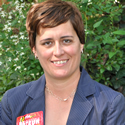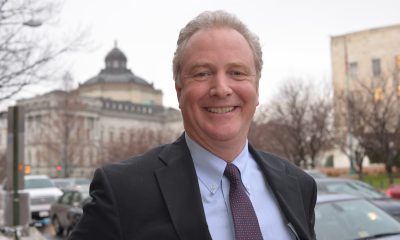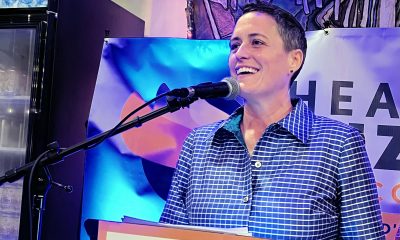Living
Queery: Heather Mizeur
20 gay questions with the Maryland state delegate

Heather Mizeur appears poised for re-election to the Maryland House of Delegates representing the 20th District (Montgomery County) after Tuesday’s primary.
Mizeur, who ran on a platform of broader health care availability, renewable energy production and equal rights for gays, says being openly lesbian has been a political advantage.
“The district overall is overwhelmingly progressive, one of the most progressive in the state,” she says. “That doesn’t mean there aren’t pockets of conservatives, but by and large, it’s really been an asset more than anything else. When I was running in 2006 there were seven of us running for three seats. Two were incumbents, five were challengers. When I was knocking on doors, I heard some people say, ‘You’re all the same on so many of the issues, I’m having a hard time distinguishing.’ Being able to say, ‘Well, I’m a lesbian,’ helped me stand out.”
Mizeur, a 37-year-old Takoma Park resident, grew up in Blue Mound, Ill., and came to Washington in 1994 where she worked in the offices of several Democratic members of Congress. She was Sen. John Kerry’s director of domestic policy from 2003 to 2006. A former Takoma Park City Council member, Mizeur has been in the General Assembly since 2007.
She gained national exposure when she was named a pivotal superdelegate at the 2008 Democratic National Convention in Denver, an episode she remembers with mixed feelings.
“I actually could have done without a lot of the elements of that process,” she says. “I felt there was too much emphasis on the candidates trying to court and recruit from the delegate count rather than running the primary system. … I didn’t think it was my place to pick a side or step in until all the voters had their say.” (She eventually endorsed Obama.)
Mizeur enjoys golf, wine, food, travel and quality time with family and friends in her down time. She and her spouse, Deborah Mizeur, were married in 2005 on the Chesapeake Bay and had a legal ceremony in Napa Valley, Calif., in 2008. They share their home with their dog, Chester.
How long have you been out and who was the hardest person to tell?
I came out in college, in 1993. I was most scared to tell my parents because I feared it would be the first time in my life I was going to disappoint them. We are a very close family and I was always the over-achiever, rule-following child that wanted my parents to be proud of me. I was terrified that this was going to be a wedge in our family. Thankfully, our family bond was stronger than that and after an initial bumpy few weeks, we returned to our regular interactions and my parents could not be more supportive.
Who’s your gay hero?
I don’t often think of people with labels attached, but if pressed, I would have to say Rachel Maddow. She’s done so much to promote issues of importance to our community with a savvy intelligence that resonates with audiences writ large.
What’s Washington’s best nightspot, past or present?
Ha. Well, the question presumes that I have an active nightlife. My preference is to drink really good wine with friends in the comfort of our home. When I choose to go out, though, I like MOVA quite a bit.
Describe your dream gay wedding.
We had our dream gay wedding in 2005, on the western shore of the Chesapeake Bay. Because Maryland hadn’t (and still hasn’t) stepped up to the plate on marriage equality, we borrowed from a Quaker tradition and had everyone in attendance sign an artist’s rendering of our wedding vows. This beautiful marriage license is framed and hanging in our living room. Some day soon we’ll make Maryland respect that and start granting licenses here in the Free State.
What non-gay issue are you most passionate about?
I’ve spent my entire professional career fighting to make sure that everyone in this country has access to affordable, high-quality health care. I’m most proud of laws I sponsored to cover an additional 170,000 Marylanders with health coverage. I’m eager to help Maryland implement federal health reform options in the most meaningful, innovative way possible.
What historical outcome would you change?
The assassinations of JFK, RFK and MLK
What’s been the most memorable pop culture moment of your lifetime?
As a kid, it would have to be Michael Jackson’s “Thriller” video release and craziness over his album. As an adult, I would say Melissa Etheridge playing the Grammys post-chemo and nailing her parts of the Janis Joplin song with Joss Stone. What an inspiration on how to find your strength to overcome adversity. It still gives me goose bumps.
On what do you insist?
That the toilet paper roll from the top of the roll.
What was your last Facebook post or Tweet?
Musings about missing a mentor who died of breast cancer in 1998. Penny was a state legislator in Illinois. Her niece recently contacted me to tell me she has been following my work in Maryland and that her aunt would have been proud. Caught me off guard. Made me cry. Felt like sharing the story with my friends – especially the ones from Illinois that also knew and admired her.
If your life were a book, what would the title be?
“Just a Small Town Girl”
If science discovered a way to change sexual orientation, what would you do?
Wake up, check my email, walk the dog, read the newspaper, eat breakfast, work, have lunch, go to a meeting, work, walk the dog, eat dinner, work, watch Rachel Maddow, kiss my wife goodnight, sleep. Repeat.
What do you believe in beyond the physical world?
By and large, traditional Catholic teachings. But in James’ Epistle, he says, “Faith without works is dead.” I believe we have to work in the here and now to create our heaven, our peace, our community and our relationship with our Creator.
What’s your advice for LGBT movement leaders?
Our community is as diverse as America and it will take all of us to win. So everyone take a deep breath, remember what we’re fighting for and work together.
What would you walk across hot coals for?
My wife.
What gay stereotype annoys you most?
How can you choose? They’re all so reductive.
What’s your favorite gay movie?
“Boys Don’t Cry” and “The Incredibly True Adventures of Two Girls In Love.”
What’s the most overrated social custom?
Registering for wedding gifts when you’re both already two adults that own everything.
What trophy or prize do you most covet?
Being selected a national Truman Scholar in 1994.
What do you wish you’d known at 18?
I was aware at an early age that the world is much bigger than any of us, and that learning never stops. But if I had the chance to tell my 18-year-old self anything, it would be a message similar to what many gay teens need to hear – that we’re all going to be OK. Specifically, it would have been nice to know that I will, indeed, marry an amazing woman and my parents will support me and so will my community; and that – gasp – I can even still have a viable chance at serving in elected public office as an openly lesbian candidate.
Why Washington?
It’s where political addicts live. It’s where you meet other people that want to make our country and world a better place.
Real Estate
Celebrate the power of homeownership this Fourth of July
Owning a home is powerful act of self-determination

This Fourth of July, celebrate more than independence: celebrate the power of LGBTQ+ homeownership. Explore resources, rights, and representation with GayRealEstate.com, the trusted leader in LGBTQ+ real estate for over 30 years.
Home is more than a house: it’s a symbol of freedom
As the fireworks light up the sky this Fourth of July, LGBTQ+ individuals and families across the country are not just celebrating the nation’s independence — they’re celebrating personal milestones of freedom, visibility, and the right to call a place their own.
For many in the LGBTQ+ community, owning a home represents more than stability — it’s a powerful act of self-determination. After generations of discrimination and exclusion from housing opportunities, more LGBTQ+ people are stepping into homeownership with pride and purpose.
Why homeownership matters to the LGBTQ+ community
While progress has been made, LGBTQ+ homebuyers still face unique challenges, including:
- Housing discrimination, even in states with legal protections
- Limited access to LGBTQ+ friendly realtors and resources
- Concerns about safety and acceptance in new neighborhoods
- Lack of representation in the real estate industry
That’s why the Fourth of July is a perfect time to reflect not just on freedom as a concept, but on how that freedom is expressed in the real world — through ownership, safety, and pride in where and how we live.
Finding LGBTQ+ Friendly Neighborhoods
One of the top concerns for LGBTQ+ buyers is whether they’ll feel safe, accepted, and welcome in their new neighborhood. Thanks to evolving attitudes and stronger community support, many cities across the U.S. now offer inclusive, affirming environments.
Some of the best cities for LGBTQ+ home buyers include:
- Wilton Manors, Fla. – A vibrant LGBTQ+ hub with strong community ties
- Palm Springs, Calif. – A longtime favorite for LGBTQ+ homeowners
- Asheville, N.C. – Progressive and artsy, with growing LGBTQ+ visibility
- Portland, Ore. – Inclusive, eco-conscious, and diverse
- Philadelphia, PA – Rich in history and LGBTQ+ community leadership
When you work with an LGBTQ+ friendly realtor, you get insight into more than property values — you get a real perspective on where you’ll feel most at home.
Navigating the real estate process with confidence
Whether you’re a first-time gay homebuyer or preparing to sell your home as an LGBTQ+ couple, it’s essential to understand your rights and options. Here are a few key tips:
1. Work with a trusted LGBTQ+ real estate agent
Representation matters. A gay realtor, lesbian real estate agent, or LGBTQ+ friendly agent understands the unique concerns you may face and advocates for you every step of the way.
Use GayRealEstate.com to connect with LGBTQ+ real estate agents near you. For over 30 years, we’ve helped LGBTQ+ buyers and sellers find their ideal home and a professional who respects their identity.
2. Know your legal protections
While federal law (via the Fair Housing Act and Supreme Court rulings) prohibits housing discrimination based on sexual orientation or gender identity, enforcement can vary by state. Make sure to research:
- State-level housing discrimination laws
- Local LGBTQ+ protections and resources
- What to do if you experience discrimination during a transaction
3. Secure inclusive financing
While most lenders follow fair lending rules, it’s smart to seek out banks or credit unions with LGBTQ+ inclusive policies and a history of non-discriminatory lending practices.
4. Plan for the future as a family
For same-sex couples, especially unmarried partners, it’s vital to review how you’ll hold the title, designate beneficiaries, and plan your estate.
Ask your agent or attorney about:
- Joint tenancy with right of survivorship
- Living trusts
- Powers of attorney and healthcare proxies
Selling a home as an LGBTQ+ homeowner
If you’re listing your home, working with a gay-friendly real estate agent ensures your identity and story are honored — not hidden — in the process.
Highlight:
- Your community connections
- Your home’s role in creating a safe space
- Local LGBTQ+ resources to attract like-minded buyers
Showcasing the full value of your home includes sharing what it meant to live there authentically and safely.
Your home, your freedom
The Fourth of July reminds us that freedom isn’t just an abstract idea — it’s lived every day in the spaces where we find comfort, love, and belonging. For the LGBTQ+ community, the right to own and thrive in a home is part of the larger journey toward full equality.
At GayRealEstate.com, we believe every LGBTQ+ person deserves:
- A safe place to live
- A community that welcomes them
- An advocate in the home buying or selling process
Ready to make a move?
Whether you’re dreaming of your first home, upgrading with your partner, or selling a space that helped shape your identity, GayRealEstate.com is your trusted partner. With our nationwide network of gay realtors, lesbian real estate agents, and LGBTQ+ friendly professionals, we make your journey smooth, respectful, and informed.
Visit GayRealEstate.com to:
- Search LGBTQ+ friendly homes
- Connect with inclusive real estate agents
- Access free guides for buyers and sellers
- Protect your rights and get expert advice
This Fourth of July, celebrate more than independence — celebrate your freedom to live, love, and own with pride.

Did you melt like the Wicked Witch of the West this week?
As summer temperatures rise, keeping your home or apartment cool during a heat wave can become both a comfort issue and a financial challenge. One of the most effective ways to keep a home cool is to prevent heat from entering in the first place. Sunlight streaming through windows can significantly raise indoor temperatures. Consider the following solutions:
• Close blinds or curtains during the hottest parts of the day. Blackout curtains or thermal drapes can reduce heat gain by up to 30%.
• Install reflective window films to block UV rays and reduce solar heat without sacrificing natural light.
• Use outdoor shading solutions such as awnings (yes, the ones you removed because they were “dated”) and shutters to limit direct sunlight.
Fans are a cost-effective way to circulate air and create a wind-chill effect that makes rooms feel cooler.
• Ceiling fans should rotate counterclockwise in the summer to push cool air down.
• Box fans or oscillating fans can be placed near windows to pull in cooler evening air or push hot air out.
• Create a cross-breeze by opening windows on opposite sides of your home and positioning fans to direct airflow through the space.
• For an extra cooling effect, place a bowl of ice or a frozen water bottle in front of a fan to circulate chilled air.
To optimize natural ventilation, open windows early in the morning or late in the evening when outdoor temperatures drop. This allows cooler air to flow in and helps ventilate heat that built up during the day.
Appliances and electronics generate a surprising amount of heat. To reduce indoor temperatures:
• Avoid using the oven or stove during the day; opt for no-cook meals, microwave cooking, or grilling outside.
• Run heat-producing appliances like dishwashers and clothes dryers in the early morning or late evening.
• Unplug electronics when not in use, as even standby power can add heat to your space.
• Switching to energy-efficient LED lightbulbs can also reduce ambient heat compared to incandescent lighting.
If you do use an air conditioner, maximize its effectiveness by:
• Setting it to a reasonable temperature—around 76–78°F when you’re home and higher when you’re away.
• Cleaning or replacing filters regularly to maintain airflow and efficiency.
• Sealing gaps around doors and windows to prevent cool air from escaping. (Didn’t we all have a parent who said, “Close the door. You’re letting all the cool out?”)
• Using a programmable thermostat to optimize cooling schedules and reduce energy use.
If it is not cost-prohibitive, adding insulation in attics and walls can greatly reduce heat transfer. Solar panels that reflect heat can also help, as well as offset the cost of their installation. Adding weatherstripping around doors and windows, sealing cracks, and using door sweeps can make a significant difference in keeping heat out and cool air in.
Natural and eco-conscious methods can also help cool your home.
• Snake plants, ferns, or rubber trees can improve air quality and slightly cool the air through transpiration.
• White or reflective roof paint can reduce roof temperatures significantly.
• Cooling mats or bedding can make sleeping more comfortable without cranking up the A/C.
For renters or those who can’t make permanent modifications, there are still plenty of ways to keep cool.
• Use portable fans and A/C units instead of built-in systems, making sure they are the correct size for your space.
• Removable window film or static cling tinting can reflect heat without violating your lease.
• Install tension rod curtains or temporary blackout panels instead of hardware-mounted window coverings.
• Add draft blockers and weatherstripping tape that can be applied and removed without damage.
• Cover floors with light-colored rugs to reflect heat rather than absorb it.
• If allowed, use temporary adhesive hooks to hang reflective materials or light-filtering fabrics over windows.
Even if your space is warm, you can still take steps to help your body stay cool.
• Wear light, breathable fabrics like cotton or linen.
• Stay hydrated and avoid caffeine or alcohol during peak heat hours.
• Take cool showers or use damp cloths on your neck and wrists to bring your body temperature down.
Keeping your home or apartment cool in the summer doesn’t have to be expensive or energy-intensive. With a few adjustments such as blocking sunlight, optimizing airflow, using fans effectively, and making renter-friendly upgrades, you can create a more comfortable indoor environment while keeping energy bills in check.
Valerie M. Blake is a licensed Associate Broker in D.C., Maryland, and Virginia with RLAH @properties. Call or text her at 202-246-8602, email her at DCHomeQuest.com, or follow her on Facebook at TheRealst8ofAffairs.
Real Estate
The world’s on fire and D.C. is on sale (sort of)
Prices are up, but then again, nothing makes sense anymore

ICE is disappearing people, revered government agencies are shuttering, and who knows if we’ll be in World War III next week? But can you believe prices in D.C. are actually still up 6.3% since last year? It doesn’t make sense, and perhaps that does make sense, because nothing seems to make any sense any more.
That said, there are some parts of our market that are truly suffering. The interest rates, which have been up, up, up for about four years now, are the ongoing rain on our market’s military parade. Combine that with 75,000 federal employees taking a buyout nationwide, and DOGE cuts eliminating around 40,000 federal jobs in the District (per estimates by the D.C. CFO), not to mention thousands of other job losses in non-governmental organizations due to funding and program cuts, and you’ve got a case of uncertainty, and downright unaffordability in the pool of otherwise would-be buyers.
This has had a marked impact on properties that starter-home buyers and low- to mid-level employees would otherwise buy, most notably condominium and cooperative apartment units. These properties have already slowed in our market thanks to the profound impact that higher interest rates have had on their monthly carrying costs—pair that with job insecurity, and a lot of condos are proving to be very difficult to sell indeed.
So how is the average sale price up in our market?
The increase is almost entirely due to the resounding strength of the single-family home market, especially in upper Northwest D.C., where it is still quite common to see bidding wars, even on properties pushing past the $3M mark. It seems that buyers in that echelon are less impacted by a few percentage points in the interest rate, and less concerned about their job security. Notably, those buyers are often married with children and have an absolute need for more space, must stay in the area due to one spouse’s job, or the kid’s friend group, regardless of whether the cost of owning is thousands of dollars more per month than it would have been in 2020 or 2021. The continued appreciation in these neighborhoods defies imagination.
So, what to do if you are not one of those lucky enough to be shopping for a $3M home? The short answer: wait. If you want more space, rent your current place out and learn the joys of being a landlord while someone else pays your mortgage. Need the equity from your current home to buy your next place? Get a home equity line of credit, or loan, and pull the equity out of your current place to buy the next one. Or—and I have never recommended this before in 21 years of being a Realtor—rent for a few years. Sure, I’d love to list and sell your condo so you can climb the real estate ladder, but it might just be a waste of time, money or both if you could just ride out this storm and sell in a DOGE-less future.
All this said, there are some condos that seem to be immune from this recent negative news. Anecdotally, it feels like it’s the truly special ones that do just fine no matter the market. Our recent listing in Capitol Hill had a view from every one of its 15 windows of the Supreme Court. Sold in five days with six offers. Another condo was on the top two floors of a townhouse and had the coolest black wood floors that gleamed like a grand piano. Sold in four days at full price.
So, all is not for naught if you have a condo or home in an area that people want to be in, with nice space, light, amenities and a certain je ne sais quois. And, as long as we have a democracy in a few years, my experience says our market will be back, stronger than ever, really soon.
David Bediz is a Realtor and mortgage loan broker for the Bediz Group LLC and Home Starts Here, LLC. Reach him at [email protected].
-

 Federal Government2 days ago
Federal Government2 days agoTreasury Department has a gay secretary but LGBTQ staff are under siege
-

 Virginia3 days ago
Virginia3 days agoDefying trends, new LGBTQ center opens in rural Winchester, Va.
-

 District of Columbia2 days ago
District of Columbia2 days agoGay GOP group hosts Ernst, 3 House members — all of whom oppose Equality Act
-

 Opinions4 days ago
Opinions4 days agoUSAID’s demise: America’s global betrayal of trust with LGBTQ people













